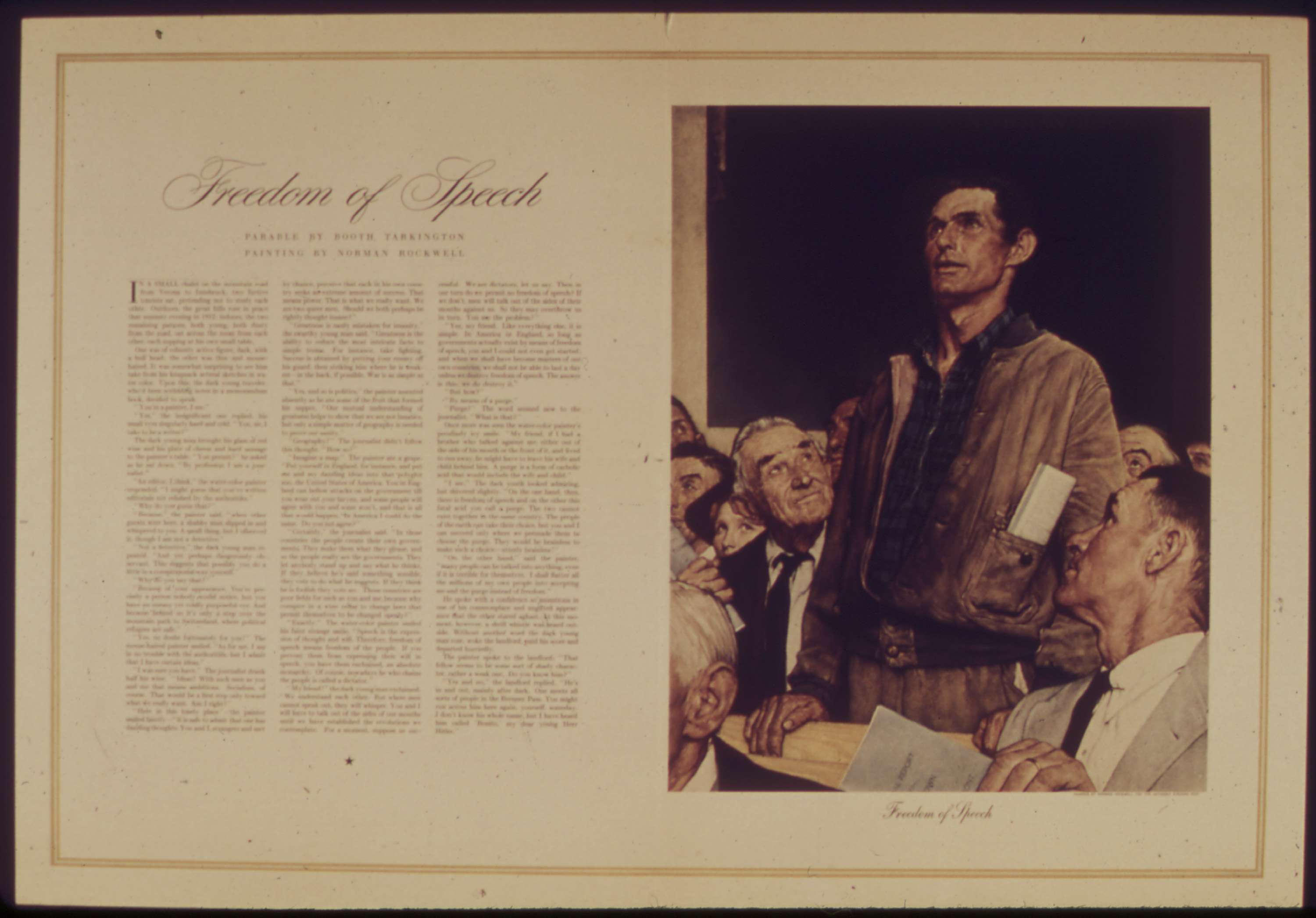"Freedom of Speech" Poster
1941 - 1945
Add to Favorites:
Add all page(s) of this document to activity:

This World War II poster includes a painting by artist Norman Rockwell, illustrating "freedom of speech" – one of four freedoms outlined by President Franklin Roosevelt during his annual message to Congress (State of the Union speech) on January 6, 1941. The speech became known as FDR's "Four Freedoms Speech" due to a short closing portion in which he described his vision for extending American ideals throughout the world.
With World War II underway in Europe and the Pacific, FDR asked the American people to work hard to produce armaments for the democracies of Europe, to pay higher taxes, and to make other wartime sacrifices. Roosevelt presented his reasons for American involvement, making the case for continued aid to Great Britain and greater production of war industries at home. In helping Britain, President Roosevelt stated, the United States was fighting for the universal freedoms that all people deserved.
Roosevelt proposed four fundamental freedoms that all people should have. His "four essential human freedoms" included some phrases already familiar to Americans from the Bill of Rights, as well as some new phrases: freedom of speech, freedom of worship, freedom from want, and freedom from fear. These symbolized America's war aims and gave the American people a mantra to hold onto during the war.
Norman Rockwell created a series of paintings illustrating the four freedoms as international war goals that went beyond just defeating the Axis powers. In the series, he translated abstract concepts of freedom into four scenes of everyday American life. Although the federal government initially rejected Rockwell's offer to create paintings on the four freedoms theme, the images were publicly circulated when The Saturday Evening Post, one of the nation's most popular magazines, commissioned and reproduced the paintings. After winning public approval, the paintings served as the centerpiece of a massive U.S. war bond drive and went on a national tour to raise money for the war effort.
After the war, the four freedoms appeared again, embedded in the Charter of the United Nations.
With World War II underway in Europe and the Pacific, FDR asked the American people to work hard to produce armaments for the democracies of Europe, to pay higher taxes, and to make other wartime sacrifices. Roosevelt presented his reasons for American involvement, making the case for continued aid to Great Britain and greater production of war industries at home. In helping Britain, President Roosevelt stated, the United States was fighting for the universal freedoms that all people deserved.
Roosevelt proposed four fundamental freedoms that all people should have. His "four essential human freedoms" included some phrases already familiar to Americans from the Bill of Rights, as well as some new phrases: freedom of speech, freedom of worship, freedom from want, and freedom from fear. These symbolized America's war aims and gave the American people a mantra to hold onto during the war.
Norman Rockwell created a series of paintings illustrating the four freedoms as international war goals that went beyond just defeating the Axis powers. In the series, he translated abstract concepts of freedom into four scenes of everyday American life. Although the federal government initially rejected Rockwell's offer to create paintings on the four freedoms theme, the images were publicly circulated when The Saturday Evening Post, one of the nation's most popular magazines, commissioned and reproduced the paintings. After winning public approval, the paintings served as the centerpiece of a massive U.S. war bond drive and went on a national tour to raise money for the war effort.
After the war, the four freedoms appeared again, embedded in the Charter of the United Nations.
This primary source comes from the Records of the Office of Government Reports.
National Archives Identifier: 515599
Full Citation: Poster 44-PA-1917C; Freedom of Speech; 1941 - 1945; World War II Posters, 1942 - 1945; Records of the Office of Government Reports, Record Group 44; National Archives at College Park, College Park, MD. [Online Version, https://docsteach.org/documents/document/1-freedom-of-speech, April 18, 2024]Rights: In Copyright Learn more on our privacy and legal page.



